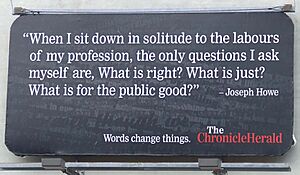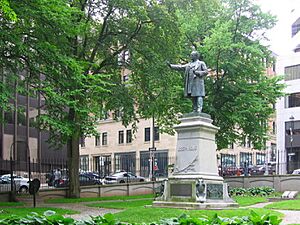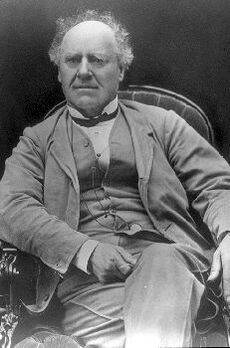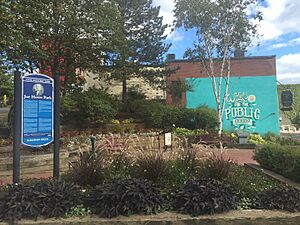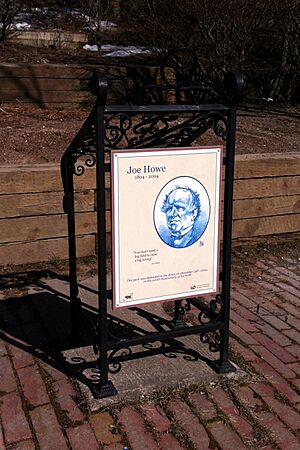Joseph Howe facts for kids
Quick facts for kids
Joseph Howe
|
|
|---|---|
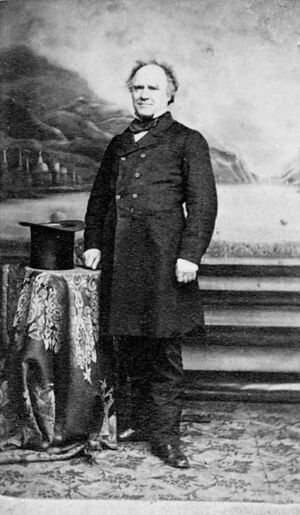
|
|
| 3rd Lieutenant Governor of Nova Scotia | |
| In office May 1, 1873 – June 1, 1873 |
|
| Monarch | Victoria |
| Governor General | The Earl of Dufferin |
| Premier | William Annand |
| Preceded by | Charles Hastings Doyle |
| Succeeded by | Adams George Archibald |
| Premier of the Colony of Nova Scotia | |
| In office August 3, 1860 – June 6, 1863 |
|
| Preceded by | William Young |
| Succeeded by | James W. Johnston |
| MP for Hants | |
| In office 1867–1873 |
|
| Preceded by | None |
| Succeeded by | Monson Henry Goudge |
| MLA for Halifax County | |
| In office 1836 – February 24, 1851 |
|
| MLA for Cumberland County | |
| In office 1851–1855 |
|
| Preceded by | None |
| Speaker of the Nova Scotia House of Assembly | |
| In office 1840–1843 |
|
| Preceded by | Samuel George William Archibald |
| Succeeded by | William Young |
| Personal details | |
| Born | December 13, 1804 Halifax, Nova Scotia |
| Died | June 1, 1873 (aged 68) Halifax, Nova Scotia, Canada |
| Political party | Reformer |
| Spouse | Catherine Susan Ann McNab (1806–1890) |
| Signature | |
Joseph Howe (December 13, 1804 – June 1, 1873) was an important person from Nova Scotia. He was a journalist, a politician, a public servant, and even a poet. Many people think Joseph Howe was one of Nova Scotia's most respected politicians. His amazing skills as a journalist and writer made him a legend in the province.
He was born in Halifax. His father, John Howe, was a loyalist who loved Great Britain and its Empire. Joseph inherited this strong loyalty. When he was 23, Joseph Howe, who taught himself a lot by reading, bought a newspaper called the Novascotian. He quickly made it very popular and powerful. He wrote many reports about the debates in the Nova Scotia House of Assembly. He also traveled all over the province, writing about its places and people.
In 1835, Howe faced a serious legal challenge. The Novascotian had published a letter that criticized Halifax politicians and police for taking public money. Howe was accused of a crime for this. He defended himself in court for over six hours. He gave many examples of corruption in the city. Even though the judge wanted him found guilty, the jury was moved by his speech. They found him innocent. This case was a big step for freedom of the press in Canada.
The next year, Howe was elected to the assembly as a reformer. This started his long public career. He played a key role in helping Nova Scotia become the first British colony to get responsible government in 1848. This meant the government had to answer to the people. He was the Premier of Nova Scotia from 1860 to 1863. From 1866 to 1868, he led the fight against Canadian Confederation, but he was not successful. After failing to convince Britain to stop Confederation, Howe joined the federal government in 1869. He helped bring Manitoba into the new country. In 1873, Howe became the third Lieutenant Governor of Nova Scotia. Sadly, he died just three weeks after taking office.
Contents
Joseph Howe's Early Life
The Howe family came from Massachusetts and were Puritan. They stayed loyal to the British King during the American Revolution. After the American revolutionaries won independence, the family of John Howe moved to Canada. They were part of a large group called United Empire Loyalists. John Howe arrived in Halifax in 1779. He opened a printing shop and published the first Halifax Journal in 1780. In 1801, John Howe was rewarded for his loyalty. He became the King's Printer. In 1803, he became the deputy postmaster for Nova Scotia, New Brunswick, and Prince Edward Island.
In 1798, John Howe married Mary Edes. Their son, Joseph, was born in Halifax on December 13, 1804. Joseph was John's eighth child and Mary's second. John's first wife had passed away.
Like many boys at that time, Joseph Howe went to the Royal Acadian School. Then, at age 23, he started working as an apprentice in his father's printing shop. He married Catherine Ann Susan McNab on February 2, 1828.
In the same year, he started his own printing business. He bought the Nova Scotian, a newspaper in Halifax. Howe was its editor until 1841. He made the paper the most important one in the province. He reported on the government's debates. He also published local stories and his own travel writings. He used the newspaper to teach the people of Nova Scotia, and himself. Many people say he was one of the greatest Canadian journalists.
Howe's Important Court Case
On January 1, 1835, Howe's Novascotian newspaper published a letter. This letter, written by someone else, accused Halifax politicians and police of taking £30,000 over 30 years. The politicians were very angry. They accused Howe of a serious crime called seditious libel. This meant he was accused of publishing something that harmed the government's reputation.
Howe's situation looked difficult because proving the truth was not a defense. The prosecution only needed to show that Howe had published the letter. Howe decided to be his own lawyer. For over five hours, he spoke to the jury. He gave many examples of corruption in the city. He spoke strongly about how important it was for the press to be free. He asked the jurors to "leave an unshackled press as a legacy to your children." Even though the judge told the jury to find Howe guilty, they took only 10 minutes to find him innocent. This decision was a very important moment for freedom of the press in Canada.
After the trial, Brenton Halliburton's son, John C. Halliburton, was very angry about the outcome and Howe's writings. He challenged Howe to a duel. The duel happened on March 14, 1840, at Point Pleasant. Haliburton missed his shot. Howe then fired his gun into the air on purpose, showing he did not want to harm Haliburton.
Howe's Political Journey
Eventually, Howe decided to run for office. He wanted to make the changes he wrote about in his newspaper. He was first elected in 1836. He campaigned on the idea of supporting responsible government. At first, Howe only suggested an elected council. But he quickly agreed with the idea of a fully representative government. He didn't like formal political parties much, thinking they were too strict. However, because of him, members who believed in Liberal ideas were in charge of the assembly from 1836 to 1840. In 1840, he worked with Conservative leader James William Johnston. He hoped this would help the cause of responsible government. Howe was the Speaker of the assembly in 1841. In 1842, he became the collector of taxes for Halifax.
This working relationship ended because of different political disagreements. Howe resigned from the Council in 1843. His efforts to promote political ideas in his newspapers paid off. In the 1847 election, the Liberals won seven more seats. This led to the first responsible government in Canada in January 1848. While James Uniacke was officially the Premier, many people saw it as Joseph Howe's government. Howe became the Provincial Secretary. He helped change the government system to fit the new responsible government. He also started a plan to build railways.
In 1853, he resigned as Provincial Secretary. He became Nova Scotia's first Chief Commissioner of Railways. In this role, he oversaw the first steps of building the Nova Scotia Railway. Howe also helped recruit American soldiers for the Crimean War. These activities left him with little time to campaign in the 1855 election. He lost to Charles Tupper in Cumberland. This election also caused problems with Catholic members of the Liberal party because Howe had made fun of their religious beliefs. This led to a Liberal defeat in 1856. The Liberals did not return to power until 1860. At that time, Howe became provincial secretary. When the Premier, William Young, became a judge later that year, Joseph Howe took over the party leadership. He became Premier. He served as Premier until 1863. Then, he took a job as the Imperial Fisheries Commissioner.
The Confederation Debate
Howe's work with fisheries meant he couldn't attend the Charlottetown Conference. By the time he returned to Nova Scotia in November 1864, the Quebec Conference had already happened. The plans for Confederation, called the Quebec Resolutions, were already widely known. He didn't have a chance to change them. He led Nova Scotia's movement against Confederation. He believed the Quebec Resolutions were not good for the province.
Because he was still connected to the imperial fishery, he first showed his opposition secretly. He wrote a series of 12 articles called the Botheration Letters. These appeared in the Morning Chronicle newspaper between January and March 1865. This was all he did in the Confederation debate until March 1866. He then learned that Charles Tupper planned to force the Confederation Resolution through the legislature. When he couldn't stop it, Howe started a strong campaign to cancel Confederation. He sent groups to London and published many anti-Confederation papers and pamphlets. This plan failed to stop the British Parliament from passing the British North America Act in 1867.
Nova Scotians elected 18 out of 19 anti-Confederation candidates to the first Canadian Parliament. Joseph Howe led the anti-Confederation group in the House of Commons of Canada. He gave a speech there about why he was against Confederation.
After failing to stop Confederation in 1868, Howe realized that further protests were useless. He refused to consider leaving the Canadian Confederation or joining the United States. This was because of his strong loyalty to Britain. In 1869, he ran in a special election in Hants County. He wanted to get better terms for Nova Scotia within Canada, rather than keep trying to cancel Confederation. This election campaign was very hard and affected Howe's health. Many Nova Scotians still supported the anti-Confederation efforts. But the voters in Hants County continued to support Joseph Howe.
In 1869, Howe joined the Canadian government as President of the Queen's Privy Council for Canada. He had been promised "better terms" for Nova Scotia. In November 1869, he became secretary of state for the provinces. In this job, he helped Manitoba join Confederation. He left his government job to become the 3rd Lieutenant Governor of Nova Scotia after Confederation in 1873. He died in office only a few weeks after he was appointed. He is buried in Camp Hill Cemetery in Halifax, Nova Scotia.
Howe's Work with Railways
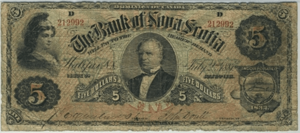
In 1854, Joseph Howe left his job as provincial secretary. He did this to lead a railway commission that included members from different political parties. The project was very expensive and was never fully finished. However, Howe was successful in completing railway lines from Halifax to Windsor.
This railway helped Halifax control trade in the Minas Basin area. It passed through the land between Halifax and Hants County. This new wealth helped the central counties become more stable economically. Because of the economic benefits in Halifax, Howe even suggested building a hotel. This hotel would attract rich travelers using the railway, but it was never built.
Joseph Howe's Poetry
Howe wrote many poems. A lot of his poetry showed his love for Nova Scotia and its history. He had published some poems during his life. He was also getting others ready for publication. But it was not until a year after he died that his family published them. They released a book called Poems and Essays.
Howe's Family Life
Before he married, Howe had a son named Edward Howe with another woman. We do not know who she was. Edward lived with his mother in a home Howe kept in Maitland, Nova Scotia.
Joseph Howe later married Catherine Susan Ann McNab on February 2, 1828. She was the daughter of Captain John McNab. Catherine was born in 1808 in the barracks at the entrance to St. John's, Newfoundland. Her father was in command of the soldiers there. She lived with her father on McNab's Island. Her uncle, Peter McNab, had lived there before. In Joseph Howe's book Poems and Essays (published in 1874), there are two poems written for his wife. Near the end of her life, the Nova Scotia government gave her a small pension. She died in Dartmouth, Nova Scotia, on July 6, 1890. She is buried next to her husband in Camp Hill Cemetery, Halifax.
Joseph Howe and Catherine Susan Ann McNab had ten children:
- Mary Howe: Born May 9, 1829, died May 12, 1829.
- Ellen Howe: Born December 3, 1830. She married Cathcart Thomson on October 22, 1851. They had four sons and two daughters. Ellen died February 5, 1910.
- Mary Howe: Born November 29, 1832, died November 1, 1853.
- Joseph Howe: Born July 7, 1834, died August 24, 1888, in Australia. He had no children.
- Sophia Howe: Born August 13, 1836, died September 13, 1837.
- James Howe: Born July 24, 1839, died October 14, 1839.
- Frederick Howe: Born around 1840. He fought in the American Civil War. He died around 1887–1889 in the US.
- Sydenham Howe: Born around 1843. He married Fanny Westphal McNab on April 26, 1870. He worked as a government auditor. He also helped start the Royal Nova Scotia Historical Society. He lived in Middleton, Nova Scotia. Sydenham died April 14, 1929. He and Fanny had 4 sons and 2 daughters.
- John Howe: Born around 1844, died June 20, 1856.
- William Howe: Born July 27, 1848. He married Helen F. Ross on September 23, 1873. They had two daughters. He married Maggie Clark on March 4, 1884, and they had no children. William died April 28, 1890.
Joseph Howe's Legacy
Many places and things are named after Joseph Howe:
- Howe Hall at Dalhousie University in Halifax, Nova Scotia.
- Joseph Howe Drive in Halifax, Nova Scotia.
- Joseph Howe Building in Halifax, Nova Scotia.
- Joseph Howe School in Halifax, Nova Scotia.
- Joseph Howe Falls in Victoria Park, Truro.
- Joseph Howe Park in Dartmouth, Nova Scotia.
- Joseph Howe Senior Public School in Scarborough (Toronto), Ontario.
- In 1973, Canada Post issued an 8-cent stamp to mark 100 years since Howe's death.
- From 1973 to 1985, a Joseph Howe Festival was held in Halifax and other places in Nova Scotia.
Archives and Media
There is a collection of Joseph Howe's papers at Library and Archives Canada.
Several plays and TV dramas have been made about Joseph Howe:
- To the editor: Sir (1983, published 1985): A play by Arthur L. Murphy about Joseph Howe's libel trial.
- The Night They Killed Joe Howe (1960): A TV drama starring Douglas Rain and James Doohan.
- The place of Joseph Howe in Canadian history (1961): A TV drama where James Barron plays Howe.
- The Case of Posterity versus Joseph Howe (1956): A dramatic argument by Joseph Schull on CBC Folio.
- Joseph Howe: The Tribune of Nova Scotia (1961): A short film.
Images for kids
-
Joseph Howe by Henry Sandham, Province House (Nova Scotia), from photo by Notman
Electoral Record
| Canadian federal election, 1867: Hants | ||||||||
|---|---|---|---|---|---|---|---|---|
| Party | Candidate | Votes | ||||||
| Anti-Confederation | Joseph Howe | 1,530 | ||||||
| Unknown | James King | 956 | ||||||
| Source: Canadian Elections Database | ||||||||
| By-election on 24 April 1869
On Mr. Howe being called to the Privy Council and |
|||||
| Party | Candidate | Votes | |||
|---|---|---|---|---|---|
| Liberal–Conservative | Joseph Howe | 1,512 | |||
| Liberal | Monson Henry Goudge | 1,129 | |||
| Canadian federal election, 1872: Hants | ||||||||
|---|---|---|---|---|---|---|---|---|
| Party | Candidate | Votes | ||||||
| Liberal–Conservative | Joseph Howe | acclaimed | ||||||
| Source: Canadian Elections Database | ||||||||
See also
- The Novascotian
- Nova Scotia Heritage Day
- History of Nova Scotia
 | Kyle Baker |
 | Joseph Yoakum |
 | Laura Wheeler Waring |
 | Henry Ossawa Tanner |


